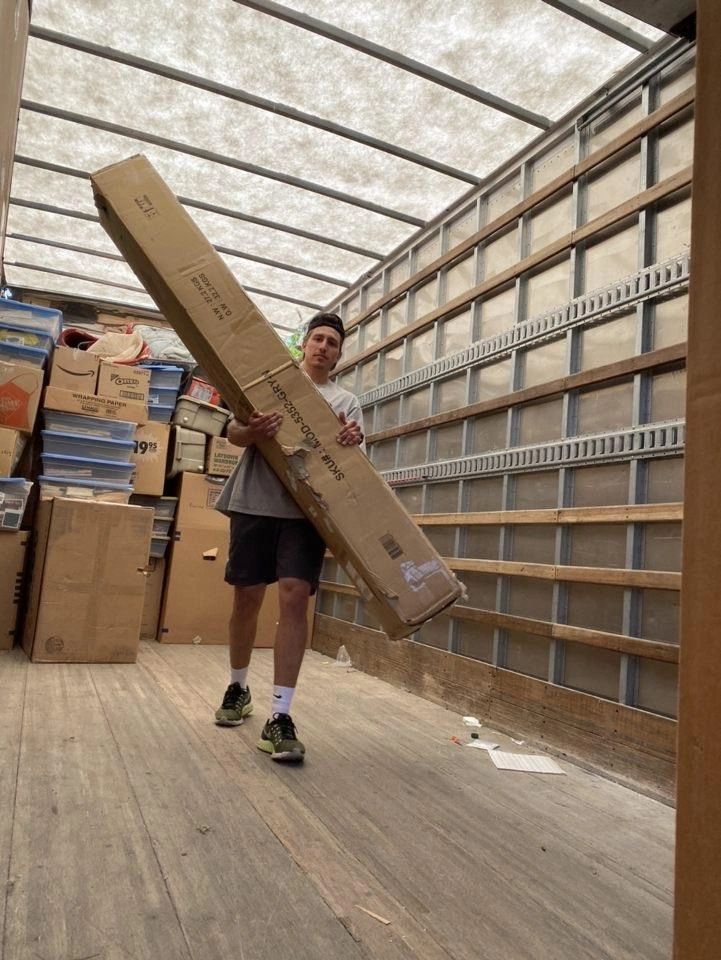Insider insights for smooth international moving logistics
Recognizing the Inclusions of moving and Freight Forwarding in the Globe of Global and residential Shipping
Guiding with the intricacies of moving and Freight forwarding can be tough. Both processes involve distinctive treatments and demands that are essential for successful transportation. Comprehending the distinctions in logistics, documentation, and risk management is vital for services and individuals alike. This expertise can significantly impact the performance and security of shipments. Several are not aware of the particular elements that influence the general experience and results. What factors should one think about to ensure a smooth transition?
The Essentials of moving and Freight Forwarding
moving and Freight forwarding are basic parts of the global logistics market. They assist in the transfer of items and personal items throughout worldwide and domestic boundaries. moving mostly includes the relocation of households or people, encompassing household and industrial requirements. It generally consists of packing, loading, transferring, and unboxing things at the location. In comparison, Freight forwarding is focused on the shipment of goods, commonly in bulk, using different transport modes, such as sea, air, or land.freight forwarders act as intermediaries, coordinating logistics to ensure timely shipment while navigating through complex regulations and customs treatments. Both procedures need careful planning, company, and interaction to ensure performance and reduce disruptions. Recognizing these fundamentals is essential for anyone included in logistics, as they lay the foundation for advanced elements of delivery and transport administration.
Key Components of Freight Forwarding Solutions
Freight forwarding services encompass numerous essential components that ensure smooth transport of products. Key responsibilities of Freight forwarders include handling logistics, coordinating shipments, and managing custom-mades clearance. Additionally, understanding crucial delivery documents is imperative for compliance and effective motion of freight.
Freight Forwarder Responsibilities
A dependable Freight forwarder plays a necessary function in coordinating the transport of products, ensuring that deliveries are handled efficiently and in conformity with regulations. Their obligations encompass various crucial tasks, including selecting optimal transportation paths, discussing Freight prices, and taking care of logistics. They serve as intermediaries between carriers and service providers, making sure that cargo is properly packaged and identified for secure transit. Additionally, Freight forwarders track shipments, supplying updates to clients about the standing and expected shipment times. They likewise evaluate and manage dangers connected with transport, recommending insurance coverage alternatives as required. By promoting interaction and documents, Freight forwarders streamline the delivery process, decreasing possible hold-ups and enhancing general supply chain effectiveness.
Shipping Documents Fundamentals

Understanding Custom-mades Clearance and Paperwork
Exact paperwork is essential in the customizeds clearance procedure, as it guarantees conformity with various guidelines. An overview of personalizeds laws highlights the complexities encountered by shippers and Freight forwarders. Usual clearance obstacles can significantly influence shipment timelines and costs, making understanding this element necessary for reliable logistics.
Significance of Accurate Paperwork
Steering with the intricacies of global shipping requires a keen understanding of personalizeds clearance and the critical role of documents. Precise documents is vital for making certain that deliveries comply with laws and reach their locations right away. Appropriately prepared documents, including bills of lading, business invoices, and packaging checklists, promote smooth communications with custom-mades authorities. Inaccuracies can cause delivery hold-ups, penalties, or even confiscation of products. Extensive documents help in monitoring shipments and fixing disagreements. Businesses involved in moving and Freight forwarding need to focus on thorough documentation practices to browse the detailed landscape of global shipping effectively. This diligence not just streamlines procedures however likewise improves client contentment by making sure prompt shipment.
Custom-mades Laws Overview
Guiding custom-mades policies is an essential element of worldwide trade that directly affects the success of moving and Freight forwarding operations. Effective personalizeds clearance calls for an understanding of various regulations, including tolls, obligations, and import/export constraints. Exact paperwork is essential, as it assures conformity with lawful needs and assists in the reliable motion of goods throughout borders. Key papers usually consist of commercial billings, packing checklists, and expenses of lading, which provide detailed details about the delivery. Additionally, customs brokers play a critical function in guiding intricate regulations, functioning as intermediaries in between shippers and customizeds authorities. By maintaining extensive knowledge of customs processes, organizations can greatly decrease hold-ups and reduce expenses related to global delivery.
Usual Clearance Challenges
Countless obstacles can emerge throughout the customs clearance process, typically complicating the activity of products across boundaries. One considerable concern wants documentation, which can lead to fines and delays. Merchants and importers need to assure all called for documents, such as billings, packaging checklists, and certifications of origin, is exact and complete. Additionally, inconsistencies in appraisal can activate analysis from customizeds authorities, resulting in added responsibilities or examinations. Language barriers might likewise position obstacles, as miscommunication can bring about misconceptions relating to regulations. Modifications in customizeds regulations can produce confusion, requiring continuous caution by carriers. Eventually, getting rid of these clearance challenges requires detailed preparation and a clear understanding of customs needs to facilitate smooth worldwide purchases.
Packaging and Labeling Demands
Commonly ignored, product packaging and labeling needs play an important function in the shipping process, making certain that products are secured and quickly recognizable throughout their journey (shipping company). Proper product packaging safeguards items from damages during transportation, while additionally assisting in reliable handling and storage. Making use of suitable products, such as bubble cover, foam, or tough boxes, can stop visite site breakage and loss.Labeling is equally essential. Clear and precise labels communicate important info, consisting of the destination, managing instructions, and components. Tags should follow regulations details to domestic and global shipping, which might consist of harmful materials identification or customs declarations.Moreover, standardized labeling practices simplify the monitoring procedure and boost overall logistics efficiency. By sticking to product packaging and labeling needs, businesses reduce the danger of delays, damage, or misdelivery. Inevitably, these practices add considerably to the success of moving and Freight forwarding operations, guaranteeing a smooth shipping experience for all parties entailed
Tracking Shipments: Value and Methods
Efficient product packaging and labeling established the foundation for effective delivery administration, yet tracking shipments is just Visit Your URL as necessary in the delivery procedure. Shipment monitoring provides real-time visibility, which aids organizations and customers keep track of the progression of their products. This transparency boosts consumer complete satisfaction, considering that customers can stay notified about delivery timelines and any kind of possible delays.Several approaches assist in reliable monitoring. Barcode scanning is an usual method, utilizing unique identifiers to keep track of packages throughout their journey. In addition, general practitioner technology allows precise area monitoring, permitting for prompt updates and boosted logistics administration. Lots of delivery business currently supply electronic platforms and mobile applications that supply customers with simple accessibility to tracking information.The significance of shipment tracking can not be overemphasized; it lessens the threat of lost or damaged products, enhances functional effectiveness, and promotes trust between shippers and recipients. As a result, integrating reliable monitoring methods is crucial for successful residential and international delivery operations.
Insurance Options for Your Product
Protecting insurance coverage for goods en route is an essential consideration for businesses and people alike. Insurance coverage alternatives vary based on the sort of shipment, worth of products, and particular risks involved. Common kinds include service provider liability, which covers loss or damage while in transit, and full-value insurance coverage, supplying substantial insurance coverage for the complete worth of the goods.Shippers may additionally think about aquatic insurance policy for global deliveries, protecting versus dangers connected with sea transport. It is vital to evaluate the particular requirements of the delivery and evaluate the conditions of any policy.Furthermore, comprehending exclusions and restrictions is important to avoid prospective voids in insurance coverage. Carriers should engage with insurance coverage professionals to check out customized solutions that fit their unique circumstances. Eventually, spending in the best insurance policy can minimize economic threats and offer tranquility of mind during the delivery procedure.
Choosing the Right moving and Freight Forwarding Solution
When picking a relocating and Freight forwarding solution, it is essential for people and businesses to meticulously review their specific needs and priorities. Variables such as the quantity of items, location, and timeline play a significant function in this decision-making process. Looking into different service providers is a good idea; comparing their solutions, prices, and customer evaluations can expose valuable insights.Additionally, it is essential to think about the experience and experience of the solution supplier in taking care of particular kinds of freight, specifically for international shipments that may involve personalizeds clearance. Transparency in pricing, including any covert costs, need to also be scrutinized.Furthermore, examining the level of customer assistance supplied is essential, as prompt interaction can mitigate issues during transportation (shipping freight). Confirming the schedule of insurance coverage alternatives ensures that items are safeguarded throughout the delivery procedure. Recommended Site By taking these companies, people and steps can make educated options that align with their logistics demands
Frequently Asked Inquiries
What Kinds of Product Can Be Shipped Globally?

Exactly How Do Shipping Expenses Range Various Providers?
Shipping costs vary significantly between providers because of elements such as solution rate, cargo kind, range, and extra solutions used. Each copyright's rates version mirrors these variables, affecting general delivery expenses for consumers.
Can I Ship Hazardous Products or Perishables?
Delivering dangerous materials and perishables undergoes stringent regulations. Carriers typically require particular packaging, labeling, and paperwork. Carriers need to guarantee conformity with global and neighborhood legislations to prevent fines and guarantee safe transport.
What Should I Do if My Delivery Is Delayed?
When faced with a delivery delay, one ought to first speak to the copyright for updates. Assess any type of alerts obtained, evaluate alternative services, and keep all parties notified concerning the circumstance to decrease interruptions.
Exist Weight Limits for Delivery Containers?
Weight limitations for delivery containers differ depending on variables like container dimension and shipping regulations. Generally, typical containers have an optimum gross weight of around 30,000 to 32,000 kgs to guarantee secure transportation and handling. In contrast, Freight forwarding is concentrated on the shipment of goods, commonly in bulk, using various transportation settings, such as sea, air, or land.freight forwarders act as middlemans, coordinating logistics to assure timely delivery while navigating with complex policies and custom-mades procedures. Secret responsibilities of Freight forwarders consist of taking care of logistics, working with deliveries, and managing customs clearance. A reliable Freight forwarder plays an essential duty in collaborating the transport of goods, guaranteeing that deliveries are handled efficiently and in conformity with regulations. Reliable product packaging and labeling set the structure for effective shipment monitoring, yet tracking shipments is equally necessary in the shipping procedure. Many shipping companies currently provide electronic systems and mobile applications that provide individuals with easy accessibility to tracking information.The value of shipment monitoring can not be overstated; it decreases the threat of lost or harmed items, enhances functional performance, and promotes depend on in between receivers and shippers.